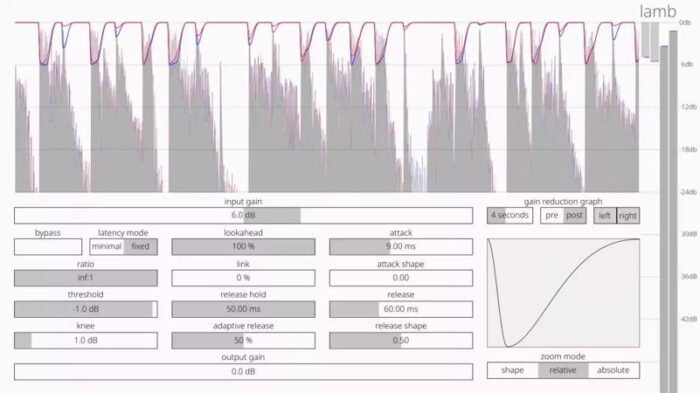Lamb v2.0.0 Win Mac Linux [FREE]
Free | Win Mac Linux | 45 MB
A lookahead compressor/limiter that’s soft as a lamb.
Lamb was made with these goals in mind:
Sound as clean as possible and as dirty as desired.
Give the user full control over the character with the minimum amount of knobs.
Features:
The following features set it apart from other compressor/limiters:
Use it as a brickwall limiter, a compressor, a leveler, a waveshaper/clipper or anything in between.
As long as the ratio is inf:1, the lookahead is 100% and the output gain is 0dB, the output will not exceed the threshold1.
When the attack, release, release hold and adaptive release are all at their minimum value, you get a waveshaper/clipper.
When adaptive release is at 100%, you get a leveler.
Adjust the shape of the attack and release.
The inspiration for this came from a video by Dan Worrall.
When shape is at 0, the curve is a slice of pure sine.
No discontinuities in the derivative of the gain reduction.
The gain never abruptly changes direction, resulting in a smoother sound, even at short attack and release times.
Release hold eliminates distortion while keeping most of the level.
Release hold prevents the gain from coming up if it needs to go back down again soon.
You control how soon is soon.
Here’s a gain reduction graph with and without it:
Adaptive release (optionally) prevents pumping.
With adaptive release, the gain won’t rush up too much when there is a quiet part after a big peak, but it will still react quickly to transients.
The first couple of dB of release have the speed you set with the release knob, after that it slows down.
The adaptive release slider controls how many dBs will release fast and how much it will slow down afterwards.
If you DO want obvious pumping, just turn adaptive release off!
Exact attack and release times allow you to easily match any breathing to the tempo of your track.
In most compressors and limiters, the times describe how long it takes to do “most” of the gain change.
In lamb, 500 ms corresponds to exactly 1/4 note at 120 BPM.
Adjust the amount of stereo linkage.
Most limiters are fully stereo linked. This makes sense, since you don’t want the stereo image to shift.
However, if the asymmetry in gain reduction is small and short enough, you won’t notice any shift in stereo image.
(Partially) unlinking left and right can sometimes sound more natural, because a loud sound on one side won’t make the other side duck in level.
Slower changes in gain reduction, caused by adaptive release, are always fully linked.
You can set the amount of linkage for transients as needed.
Choose between fixed or minimum latency.
In most case, you can leave this at fixed, but if you want to use lamb live or for tracking, you can set it to minimum.
The latency is always reported to the host.
Downsides:
There are two main downsides to this plugin:
Heavy on the CPU.
Because of the advanced algorithm, this plugin is quite heavy.
I have done everything in my power to make it lighter, from writing a highly optimized sliding minimum algorithm
to writing an N dimensional memoization function.
If you are good at math or computer science and want to help me optimize it more, open an issue, or better yet a PR!
Long latency.
The clean sound of this plugin is partially made possible by a copious amount of lookahead.
In fixed latency mode, the latency is 100ms.
In minimum latency mode, the latency depends on the attack, release hold and lookahead parameters.
Please REPORT in Comment Broken Links




